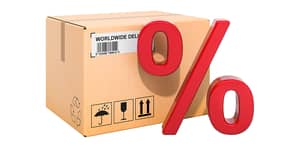You've made the sale, you've only gone and done it! But, the customer is now requesting a return, they ordered two items but only want to keep one. What do you do? How can you handle it? How do you create a small business returns policy?
Returns are part and parcel pun intended... of eCommerce selling, encountered by nearly all online retailers today. Your returns policy can be a big influencer in whether new customers decide to buy and can cause established customers to remain loyal. In fact, 95% of online consumers will repeatedly purchase from a seller if they provide a solid business returns policy or exchange experience.
At Interparcel, we work alongside businesses of all sizes every day - helping them to deliver excellent shipping solutions to their customers and provide essential customer service support.
At Interparcel, we work alongside businesses of all sizes every day - our excellent shipping solutions help them to deliver vital goods to their customers and provide that all important customer service support. We are certain that our business customers know their stuff (they're using Interparcel, how could they not!), but if you're just starting out or if you want to check you've got it covered, we've gathered all the info you'll need to put together a solid returns policy. So first off, let's get our facts straight...
Do I have to accept returns?
According to the Consumer Rights Act 2015 for England, Wales and Scotland, retail shoppers are entitled to a full refund, exchange or repair if items are faulty or not as advertised.
When you sell online (which is referred to as 'distanced selling'), customers have additional rights to return unused products. A customer can cancel their order (full or part) within 14 days of receiving their goods (better know as the 'cooling off period'), no matter the reason. Customers must notify you of the return but do not need to provide an explanation. The customer then has 14 days to return the item(s) to you and once received you have 14 days to process an exchange/refund.
It's important to note that whilst you must accept goods back and provide customers with a full refund, you are not liable for the return charges unless the item was faulty or not as described. Many businesses however do offer a free returns service, it's a great sales tactic but we'll get into that later...
When don't I need to accept returns?

There are certain circumstances that don't require you, as an online business, to process a return/refund under the Consumer Contracts Regulations these are:
- When the seal/wrapping has been broken on CDs, DVDs or software
- Tailor-made items or garments
- Personalised goods
- Items that have a health hygiene protection seal which has been broken
- Goods that have been mixed inseparably after delivery
Online retailers are also allowed to deduct money from a refund as a result of the customer handling the good more than is necessary. So if customers buy from you online and have handled the item more than they would in a brick-and-mortar shop, you can deduct money from the overall refund.
Do I have to pay for customer returns?
As an online business you aren't obliged to pay for customer returning items that are simply unwanted, but it's worth considering if you can build a free returns service into your business model. Research has show that offering free returns can be a great factor influencing customer loyalty, customers are more likely to purchase from a company that offers free returns.
Businesses are, however, required to pay for the return postage when the items received are faulty or aren't as described/advertised.
You will also be required to refund a customer for the price of the item(s) plus the cost of shipping if that individual paid for a special shipping service and the order arrived late. If however, the order did arrive on time the customer won't need to be refunded the cost of delivery.
With Interparcel, processing customer returns just got easier. We have created our 'Return Parcel' action so that businesses can benefit from low-cost parcel delivery services so offering free returns can put you ahead of the rest. This action enables users to return an order in the click of a button and provide shipping labels to customers in no time!
Paired with our 'Send Again' action, businesses can reship to the same recipient if they request exchanges, without having to re-enter the parcel details and addresses.
How to create a returns policy for your business
As online sellers are legally required to allow customers to return items, it's good to map out a returns plan prior to fulfilling orders. You are well within your rights to customise your policy 'in addition to [customers] legal rights', but to get you started we'll take you through some important areas to consider!
Have a returns policy
Now, this may seem obvious, but you'd be surprised by how many websites avoid mentioning their returns policy, perhaps hoping to minimise their occurrence. It's vital to understand that customers are just like you and me and won't just return things willy nilly, so making mention of your policy won't encourage more returns! Not mentioning the returns policy may put customers off who think you're operating a non compliant business.
Whether they have a sizing issue, or perhaps the style doesn't suit, no matter the reason, accepting returns presents your business as honest and open to communicating with customers.
Sometimes shoppers just just want to exchange for another size or perhaps they fancy upgrading to the premium option! Having a returns policy that is easily accessible and understandable can encourage customers to trust your brand. Shoppers want to frequent brands that care about them and their experience, so learning how to handle returns can be a great example of you doing this!
Enough convincing, here are some of the basic areas returns policies should always cover:
- What items can be returned (and what can't)
- How long after purchase can items be returned
- What condition must the item be in to be returned
- What is the procedure to return an item
These shouldn't take too long to figure out and most online stores have almost identical returns policies. Even if your small business returns policy is a little rudimentary to begin with, putting any sort of one in place for customers is essential.
The added benefit to setting up a clear returns system might just mean your customers return too!
Try being as clear as possible
It's never ideal when a customer wants to politely return an item to you and they have to jump through multiple hoops, click through four pages and submit their life story. It's all a bit frustrating when returns policies aren't clear or are hard to find.
Better to be clear than confusing! Handling your eCommerce returns can be simple and your customers will appreciate your efforts to keep it straightforward. And in doing so, you might even free up time for customers to continue buying.
So, getting down to the practicality of it all, these are some questions you should think about when setting up small business returns:
- Is my returns procedure clear and easy to follow?
- Will customers be aware of returns packaging protocol? e.g. using yours or their own
- Is it clear how the return shipping will be paid? e.g. is it free or do they need to book
- Is your returns time-frame clearly stated?
Some places you'll want to include these details might be:
- Your FAQ page
- Briefly on product pages
- At checkout
- Footer/Header
- Order confirmation email
If you run your eCommerce store through the likes of BigCommerce, Shopify or WooCommerce you can easily add these pages through their website building software!
Budgeting for return shipping costs

Returns themselves can be a big hurdle when providing a smooth and satisfying customer experience, so by asking your customers to pay for return postage, you're introducing more friction to the process.
Studies have shown that 62% of customers are left dissatisfied when they are asked to cover their return postage costs plus packaging. Offering customers free returns and creating a resealable packaging option for these occasions has often been observed as an effective customer retention strategy when considering consumer psychology.
When it comes to shopping online, consumers are already a little wary of buying expensive products as they aren't able to see, touch and inspect the ins and outs of them. But, if your returns policy is simple and can offer them a quick turnaround, customers will be reassured and more likely to purchase.
Reverse logistics doesn't have to break the bank for your business, by using our cost-effective parcel delivery solutions you can pay for returns without losing revenue. Why pay for a costly returns management software that will charge you per order plus a subscription fee? Using Interparcel's services is only payable when you need it, so in the event of returns, we have your back!
Interparcel doesn't just ship abroad, we also arrange imports from abroad and so you can simply book the return parcel through your Interparcel account. Our 'Return Again' action as mentioned previously, allows you to select a different shipping service than was first delivered with - so you can save money on your return postage if need be! By doing it this way, you can use our services to cheaply generate returns labels and arrange the collection from your customer - allowing you to monitor and track the parcel coming back to you!
Using your returns policy as a selling point
Small business returns policies can often work as really effective marketing elements! Driving growth through trustworthy brand experience, returns can be great at generating profits, rather than losing them.
Take Zappos, an Amazon offshoot company that sells shoes and other accessories, as a good example of this. As the first business to offer a 365-day, free two-way returns policy, Zappos execs found that their leniency promoted bigger profits.
They stated that "Our best customers have the highest return rates, but they are also the ones that spend the most money with us." Placing their stand-out returns system on headers, footers, social media and more, they effectively use this as a 'customer happiness first' marketing strategy.
With online shopping quickly becoming the new normal for many consumers, returns are fast becoming a way of life. Businesses with the right approach to handling eCommerce returns are set to be significantly better off than those who stick their head in the sand and wish returns away! A good returns policy can build customer loyalty, act as a competitive advantage and increase profits, so give it a whirl!










 Facebook
Facebook Twitter
Twitter Instagram
Instagram Linked In
Linked In YouTube
YouTube